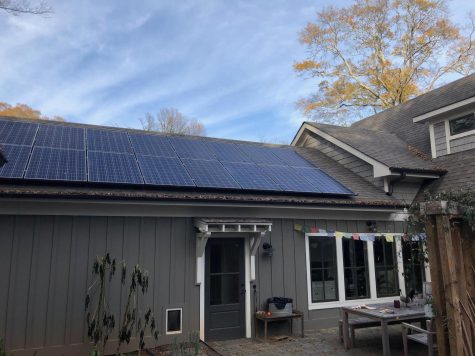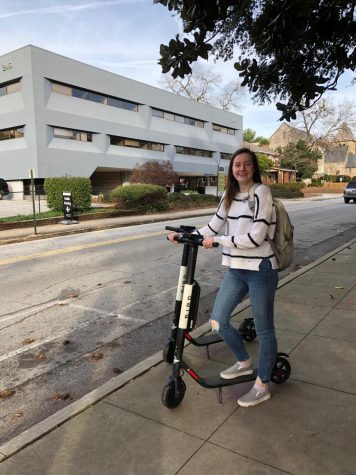Heating Up
Community members respond to increase in global warming
Every year, roughly 21.3 tons of carbon dioxide are emitted in the air because of the burning of fossil fuels, as stated by the Union of Concerned Scientists.
According to National Geographic, “Global warming describes the current rise in the average temperature of Earth’s air and oceans. Global warming is often described as the most recent example of climate change.”
Climate change is controversial, and its importance is often debated among politicians, including President Donald Trump.
In November 2012, Trump released a series of tweets on Twitter regarding climate change.
“The concept of global warming was created by and for the Chinese in order to make U.S. manufacturing non-competitive,” Trump wrote.
Republican Senator Susan Collins opposes Trump’s beliefs concerning the impact climate change has on the Earth.
“We can’t ignore the impact of climate change on our public health, environment, & economy. This should cause all of us, including the Administration, to take a harder look at the consequences of inaction,” Collins stated in response to Trump’s tweets.
The existence of climate change is primarily supported by scientific evidence, with new reports being written each year from organizations like the United Nations (UN).

The UN, an international organization made up of 193 states including the U.S., released a statement in 2018 expressing the need for concern regarding global warming. The UN claims that precautions need to be taken quickly because there are only 12 years left before climate change and global warming are irreversible. They also believe that, as early as 2040, there is a greater risk for an increase in the amount of catastrophic natural disasters that occur across the world.
“Global mean temperature will continue to rise above the pre-industrial level,” the UN stated. “The world’s oceans will warm and ice melting will continue. Average sea level rise is predicted to be 24–30 cm by 2065 and 40–63 cm by 2100 relative to the reference period of 1986–2005.”
The UN’s claims have sparked intrigue and concern among citizens in the city of Decatur. One of those concerned is Mary Jane Leach.
Leach is a member of the Decatur Environmental and Sustainability board and an advocate for environmental protection. The Environmental and Sustainability board involves a group of citizens passionate about the environment who focus on four topics during their monthly meetings. Her research on these four topics—buildings and energy, sustainability education and outreach, natural systems/food and agriculture and resource conservation—has led Leach to view global warming as a serious threat.
“I’ve been on board with the UN reports all along,” Leach said. “With the new numbers and the new level of research done—I am very pleased with people paying more attention. We really do need to act now, so yes, this is an issue that needs to be discussed and resolved.”
Experts agree that now is the best time to take action.
“We are the first generation to fully understand climate change and the last generation to be able to do something about it,” Petteri Taalas, UN Meteorological Body’s News Chief, said.
Even so, according to Leach, many people still don’t know what global warming is or how it’s caused.
“What we know now is that the heat gets trapped in the oceans and it affects our weather in some predictable and unpredictable ways, but it’s going to get more unpredictable,” she said. “People saying it is cyclical are right in some ways, but a lot of it is the result of humans’ actions in the last 30 to 40 years.”
Leach isn’t the only one in the Decatur community who studies environmental issues. Decatur resident Robert Pope works for the Environmental Protection Agency (EPA). The EPA is a U.S. government agency that focuses on the regulation of human effects on the environment, making sure there is access to clean air and water and there is proper disposal of solid and radioactive waste.
At the EPA, Pope is a project manager for the Comprehensive Environmental Compensation and Liability Act. He works to clean up radioactive and hazardous waste at private sites, chemical companies that have gone out of business, military bases and places where the U.S. made nuclear materials for the Cold War. Pope is the federal regulator over the cleanup of these projects.
Pope and Leach believe that global warming should be a primary concern for our nation. Pope focuses on the industrial causes of global warming, including greenhouse gas emissions.
“One of the main causes seems to be the production of these gases, which is just part of an industrialized world where we all drive cars and have to burn coal and gas and oil for energy,” he said.
Senior Maya Alandete has been a part of the DHS environmental club since her sophomore year and is now the club’s president. After reading the updated UN climate report, Alandete became even more concerned.
“[Increase in climate change] will be a catastrophe, an environmental catastrophe, which is incredibly alarming, and I don’t think I’ve heard that much talk about it,” she said. “I think people need to pay more attention because it is just so important.”
In Decatur, there are a variety of ways for citizens to be more environmentally conscious.

“One of the things we can do right now that has a huge impact is just our buying habits in terms of energy.” Leach said. “As a community, Decatur is going for its second round of Solarize Decatur, which means we can all, if we wish to, buy into lower cost solar programs.”
Solarize Decatur is a solar Present Value (PV) bulk-purchasing program that allows homeowners, businesses and nonprofits in Decatur and DeKalb County to save on the cost of solar energy. There are already 850 residents in the city who have signed up.
Aside from solar panels, there are still a number of ways to help the environment from catastrophes.
In 2010, Atlanta was reported to have only 53 miles of bike paths; however, in 2017, that number grew to 115 miles. This is in part due to the Beltline, which spans over 22 miles, and more bike lanes being added in the city due to biking culture which continues to grow each year.
The types of transportation being utilized have a major impact on the environment considering most cars nowadays cause air pollution.
“To use other types of transportation such as mass transit, hybrid and electric cars are also a good option, to walk more and bike more and have more bicycling paths and walking paths so you don’t have to get in your car to go everywhere,” Pope said.

As concern is growing over the amount of pollution being emitted in the air by cars, many companies, including Bird Scooters, are searching for alternative and more environmentally friendly system’s of transportation.
Bird Scooters originated in Santa Monica California in September 2017 as an alternative mode of transportation. According to the Bird website, these scooters were designed to be environmentally friendly.
“Bird scooters help reduce pollution and improve air quality. Bird scooters cut the use of vehicles and reduce the volume of traffic on the road,” Bird stated on their website.
On May 3, 2018, Atlanta became the first city in the Southeast to take part in this new mode of transportation. In Decatur, e-scooters became extremely popular, especially among students.
Decatur sophomore Kristin Hair is just one of the students who has enjoyed the Bird Scooter experience.
“I think Birds are a really cool concept. We just don’t think about how much pollution cars cause, so Birds are a really unique mode of environmentally friendly transportation. Also, riding the scooter itself is a lot of fun and it makes getting somewhere so much faster.”
At DHS, students are recognizing the causes of climate change and ways to be more environmentally conscious in their everyday lives.
“There’s just so many things [that cause climate change], but I think the biggest thing that people don’t really realize is the combination of everything we do,” Alandete said. “I think we can also just pay attention to the little things that we really don’t think about—you know, baths take up more water than showers, so maybe taking more showers than baths. Little things like that can be enormously helpful.”
Read more about the impact of Bird scooters on Decatur here.











